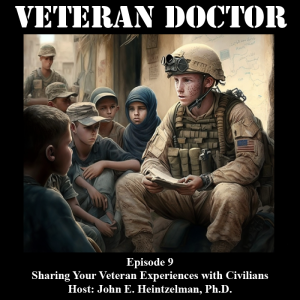
1.7K
Downloads
40
Episodes
This podcast is for anyone interested in Veteran-centric topics. Veterans have dedicated their lives to serving our country, so now it is our turn to serve them as they transition back into their civilian lives. One thing that has been discovered is that there is a lack of knowledge on the availability of resources and how to properly navigate the system upon exiting military service. This podcast's purpose is to help fill this gap of knowledge and guide veterans to the resources and information that they so deserve.
Episodes

Saturday Feb 06, 2021
Veteran Doctor - Episode 9 - Sharing Your Veteran Experiences with Civilians
Saturday Feb 06, 2021
Saturday Feb 06, 2021
Good Morning Veterans, Family, and Friends, welcome back to the NINTH EPISODE of the Veteran Doctor. On this week's podcast, we will discuss Sharing Your Veteran Experiences with Civilians. We will also continue our fun facts of UBI (Useful Bits of Information) and Veteran News, so stick around for some great stuff!
I keep running into more and more veterans who continually ask me one big question. “What is the one thing you miss the most about the military?” Well, I have to say the most significant thing is the military camaraderie that doesn’t exist in the civilian sector. The military creates a tight-knit group of people that develop bonds, and camaraderie rarely felt anywhere else. Granted, veterans have to wade through some BS to get to it sometimes, but often that camaraderie is what got us through it. There is no mistake that military camaraderie is something unique and special, and it probably ranks as the primary thing veterans miss when they transition out of the military. Certain groups exist that may come close, but the true friendships formed from experiences in military training and combat cannot be compared. I have conflicting emotions and memories as to whether I genuinely miss the military. I guess I miss portions of the military life and camaraderie, however that chapter is behind me, and it is time to create a new chapter. So how can we take this military camaraderie and share it with our civilian counterparts? Here are some ideas and advice on how to keep military camaraderie alive after you’ve transitioned to civilian life.
BRING MILITARY CAMARADERIE TO THE CIVILIAN WORLD AND FRIENDS
Many civilians you will interact with will not understand or even comprehend the bonds that military brotherhood and sisterhood are like. However, you can attempt to educate them by bringing the value of military kinship to the civilian world. Show them how to look out for other friends/co-workers, offer others help when they need it, and be loyal to each other. Nothing must be expected back, except the chance to change how people interact around you. The attitudes of others will change quickly, and it will become infectious. Additionally, it can help identify individuals who may share similar values, and you can recreate a new form of that camaraderie you miss.
TAKE UP A NEW HOBBY AND TALK TO PEOPLE
Another way to connect with people is to stop and talk to them. Grab a cup of coffee, take up a hobby, or get outside your social circle. Last month, I decided to play golf. I haven’t played golf in over ten years and have never been that good, but I just wanted to try again. So, I went and met up with three other players that I have never met before. Two players were veterans! We have a blast! We talked about old times, improved our golf, joked, and now have new golf partners. It is amazing what happens when you think outside the box. You can build some unique camaraderie if you try.
CREATE AN SUPPORT GROUP
Military camaraderie goes beyond active duty. You are not the only one who has transitioned out of the military. Finding success in the transition is different for everyone, so bumps in the road will be experienced and are inevitable. Take care of each other through these challenging times. There may be many barriers like distance and working vastly different careers, but make a real effort to keep in touch. If someone is having trouble, do what you would have done while on active duty: come together and take care of one another. Sometimes this is as simple as sending what you can monetarily spare, arranging meals, listening, or providing a place to stay during difficult times. Too many veterans fall by the wayside during this civilian transition and find themselves homeless or suicidal. Maintain your former community. As veterans, we need to look out for each other.
EXTEND YOUR COMMUNITY TO FELLOW VETERANS
Military camaraderie is strongest among veterans who have served together; however, it usually exists universally between every veteran. Despite any generational differences, when veterans meet, there is an instant kinship and common ground. Without a doubt, these moments can go a long way for both you and the fellow veterans. It can be enrichening for your soul. You can take it another level by volunteering at a veterans support group.
An example of this is at veteran homeless shelters. You can help change the lives of the vulnerable veteran population. Military camaraderie does not have to disappear when you transition and become a civilian. While we must learn how to function in the civilian world, it doesn’t mean we shouldn’t take our military values with us. The very concept of military kinship is a compelling value we can educate and offer to the civilian society while continuing to give to our fellow veterans through maintaining support networks and establishing new ones. The experience will never be precisely the same, but that military camaraderie can be just as important.

No comments yet. Be the first to say something!